Curtis Flowers, currently on death row in Mississippi, may get another trial after the U.S. Supreme Court vacated the Mississippi Supreme Court’s ruling in his sixth trial this summer. Photo courtesy MDOC
Wednesday, October 5, 2016
JACKSON — It was the summer of 1996, another Tuesday morning in July in Winona, Miss. At around 9 a.m., Bertha Tardy, the owner of Tardy Furniture Store, called Sam Jones and asked him to come in and train two new employees. When Jones arrived at the store he discovered the bodies of Tardy, Robert Golden, Carmen Rigby and Derrick Stewart, all shot in the head. Police found shell casings from .38-caliber bullets and a bloody shoeprint at the scene. All four victims eventually died.
Police interviewed local man Curtis Flowers later that afternoon after they placed him at the scene of a burglarized car missing a .38-caliber pistol that morning. Flowers consented to a gun residue test as well. Flowers had worked briefly at Tardy Furniture at the start of the month before being fired after not showing up for a few days. Police interviewed Flowers again two days later, and he gave a different account of what he did on that Tuesday. Flowers moved to Texas that September, but in March 1997, police arrested Flowers, brought him back to Mississippi and indicted him on four separate counts of capital murder.
Witness testimonies in Flowers' sixth trial revealed that $300 to $400 in cash was taken from the store during the murders, and witnesses for the state said that police found $235 in Flowers' headboard and that Flowers wore a 10-and-a-half size shoe, the same size of the bloody footprint, another state witness said. Witnesses also said that the gunshot residue test revealed one particle in the back of Flowers' right hand. Eye witnesses placed Flowers at both his uncle's car missing the .38-caliber pistol and near Tardy Furniture on Tuesday morning. One witness testified that he saw two African-American men outside of Tardy Furniture that morning. Witnesses for the defense testified that they were promised payment or implied they would get reward money for testifying against Flowers.
Six trials and 20 years later, Flowers sat in Parchman with an affirmed death-penalty conviction from the Mississippi Supreme Court—until the U.S. Supreme Court got involved in the case.
Flowers' first three trials all ended in convictions and death sentences, but none of the convictions stuck. The Mississippi Supreme Court reversed the outcome of the first two trials due to prosecutorial misconduct, specifically that the prosecutor had admitted evidence from other victims in the first trial and arguing facts not in the evidence in the second trial. It reversed the third trial, finding that the prosecutor had racially discriminated in the selection of jury members. Then there were two subsequent mistrials, in which the juries were more racially balanced, but resulted in two hung juries, unable to reach a unanimous verdict.
In trial number six, the jury had 11 white jurors, more than the previous two trials, resulting in a conviction and death sentence for Flowers.
Flowers, who is black, appealed his case back up to the Mississippi Supreme Court, claiming, in part, that the jury-selection process violated his fundamental rights under the Sixth and the 14th amendments. The Mississippi Supreme Court disagreed and sentenced him to death by lethal injection in late 2014.
That court denied Flowers' motion for rehearing at the outset of 2015, so his lawyers filed a writ of certiorari with the U.S. Supreme Court. This summer, the high court vacated the State's high court judgment in Flowers' sixth trial and remanded the case.
"The case is remanded to the Supreme Court of Mississippi for further consideration in light of Foster v. Chatman," the June order from the U.S. Supreme Court states.
Of Race and Juries
To understand the history of Flowers' case and the claims of racial discrimination in jury selection, it is vital to understand the history of landmark cases in the same vein.
When a person goes on trial for capital murder, jury selection is a natural part of the process—and a part that can sway the outcome. In 1986, the trial of James Kirkland Batson in Kentucky led to new limitations for prosecutors who attempted to strike potential jurors.
Both prosecutors and defense attorneys get an equal number of strikes during jury selection in death-penalty cases. Often, jurors are removed due to a conflict of interest in the case or because they have a predisposed inclination to not sentence someone to death on principle.
Removing a potential juror based on race or gender, however, is illegal. The Batson case solidified this standard nationally. The prosecutor in Batson's case removed all four African Americans from the jury pool, and Batson challenged the action under the Sixth and 14th Amendments. The U.S. Supreme Court sided with Batson and found that while a defendant is not entitled to have a jury completely or partially composed of people of his own race, the state is not permitted to use its peremptory challenges to automatically exclude potential members of the jury because of their race, a case summary from the U.S. Courts says.
The Batson case set a new standard: mainly that defendants in a criminal case can make an Equal Protection claim if they can show that race was a the reason a potential jury member was struck, the state must come forward and give an explanation for their exclusion.
If they succeed in proving another non-race-related reason for striking the juror, the onus goes back on the defendant. In Timothy Foster's case, his lawyers were able to prove their claim with a public-records request.
Foster was convicted of capital murder and sentenced to death in Georgia, which the Georgia Supreme Court affirmed. Foster filed for public records, however, which revealed what the U.S. Supreme Court found to be convincing evidence that lawyers rejected potential jurors due to their race. "A draft affidavit from an investigator comparing black prospective jurors and conclude(ed), 'If it comes down to having to pick one of the black jurors, [this one] might be okay," the U.S. Supreme Court opinion says.
How Foster Helps Flowers
On June 20, 2016, the U.S. Supreme Court vacated the Mississippi Supreme Court's opinion, which sentenced Flowers for execution, asking the court to consider the case in light of the Foster precedent. Alison Steiner, an attorney with the Office of the State Public Defender, says the U.S. Supreme Court granted review to only a handful of cases—out of dozens. She said the chances of getting a petition for writ of certiorari granted in a death-penalty case are low.
"Although the opinion is vague, the context suggests that there is something about the issue raised in this case (Flowers) that six members of the court did think (the outcome in) Foster required looking at again," Steiner said.
The Mississippi Supreme Court has set a briefing schedule for Flowers' case for this fall and winter. Flowers has filed a separate petition for post-conviction relief in the Mississippi Supreme Court as well.
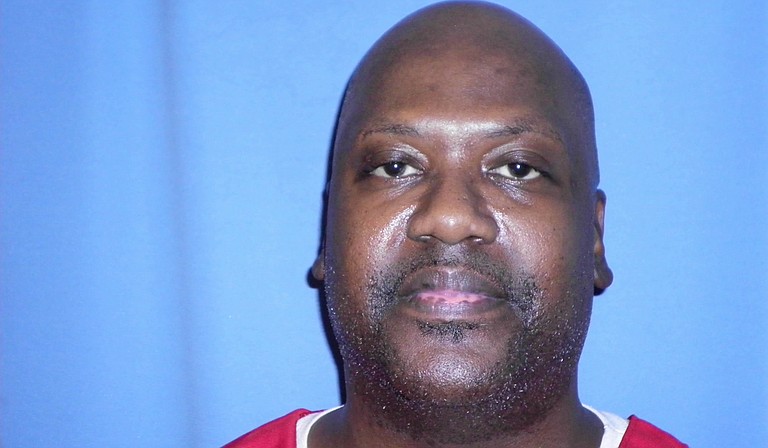
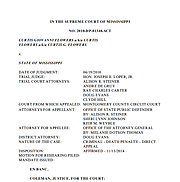
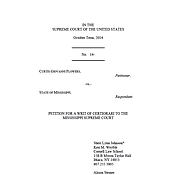
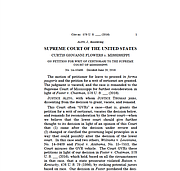
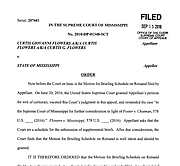
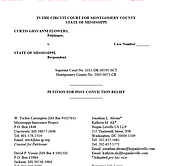
Comments
Use the comment form below to begin a discussion about this content.
Sign in to comment
Or login with:
OpenID